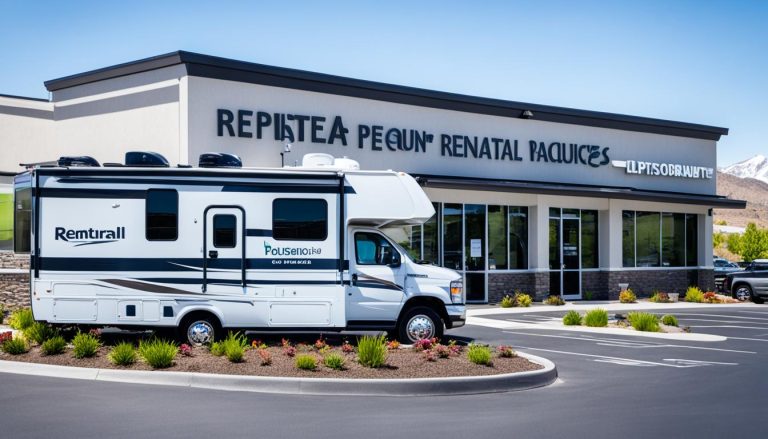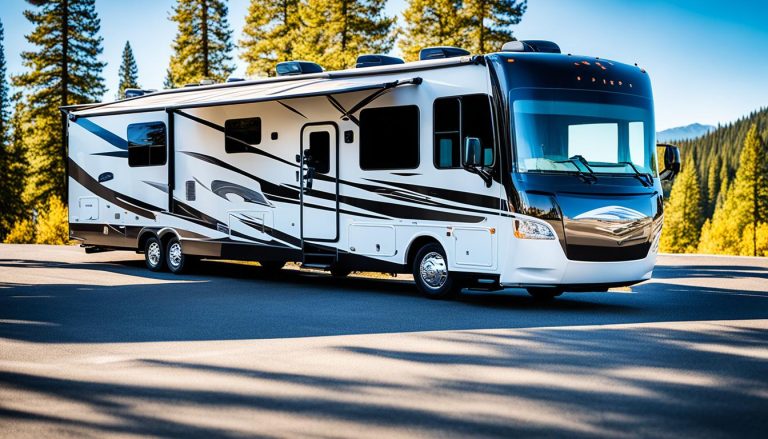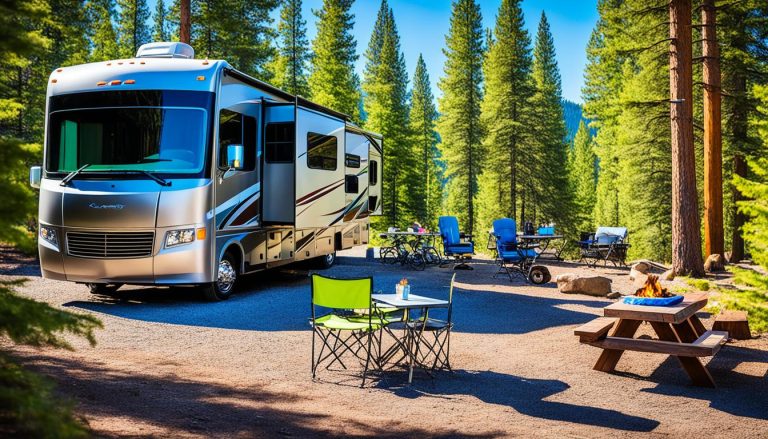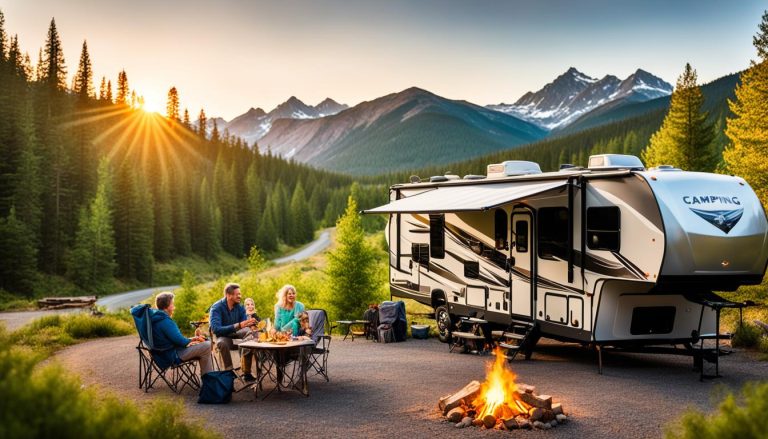Exploring Peer-to-Peer RV Rental Marketplaces
gorvlifestyle.com and its partners may earn a commission if you purchase a product through one of our links
The open road calls to adventurers across the United States, and Peer-to-Peer RV Rental Marketplaces stand at the forefront of this beckoning freedom. No longer is the quintessential road trip bound by the fleets of traditional rental agencies; today’s travelers are turning towards RV sharing platforms, which tap into the vast reservoir of privately-owned campers. Companies like RVshare and Outdoorsy have pioneered this movement, connecting wanderlust spirits with the convenience and intimacy of Peer-to-Peer camper rental. According to the data released by Kampgrounds of America’s 2022 North American Report, the popularity of renting RVs from private owners has seen an appreciable climb—a trend that remarkably perseveres even alongside climbing gas prices.
This rise in popularity is not just a testament to America’s love for adventure but also a reflection of the evolving preferences of vacation goers who now seek nearcations and affordable travel options. Enabled by the infrastructure of these burgeoning platforms, millions are answering the call of the wild, emboldened by the affordability and flexibility inherent in the peer-to-peer rental model. As the market landscape continues to shift, these platforms have redefined outdoor excursions, making family time and remote work on the go more accessible than ever.
Key Takeaways
- Peer-to-Peer RV Rental Marketplaces like RVshare and Outdoorsy are expanding the reach of road trip adventures.
- Renting directly from RV owners has become more popular, as reported by recent travel trend statistics.
- Despite economic fluctuations, travelers are increasingly booking RVs for holidays like the 4th of July.
- The RV rental industry maintains growth even with higher gas prices, due to the value of nearcations and flexible travel.
- Marketplaces are facilitating the surge in travel by meeting the demand for outdoor-focused, socially distant vacations.
- The influx of new renters to the market signifies the lasting appeal and economic benefits of peer-to-peer RV rentals.
Introduction to the Peer-to-Peer RV Rental Trend
With a remarkable shift in travel dynamics, the Peer-to-Peer RV hire movement is rapidly gaining traction. This rising trend underscores a significant change in how individuals seek out and embark on adventures. By opting to rent directly from RV owners through platforms like RVshare and Outdoorsy, it’s evident that the landscape is adapting to a new, more connected form of travel.
The Shift in RV Rental Dynamics
Previously the domain of traditional rental agencies, the RV rental marketplace is now being revolutionized. Entrepreneurial RV owners and eager adventurers are joining forces on digital platforms to facilitate unique experiences. As this marketplace burgeons, access to diverse RV options has expanded, enabling custom travel experiences that cater to the individual needs of renters.
Impact of COVID-19 on Outdoor Travel Preferences
Undeniably, the pandemic has reshaped many sectors, but perhaps none so positively as outdoor travel. The imperative for social distancing pushed many to the doorstep of secluded, autonomous getaways offered by RV rentals—a silver lining for the industry. As families yearned for safe excursion options, COVID-19’s impact on RV rentals became a tale of resilience and unexpected growth, fostering a nearly 40% increase in RV rental interest.
This transformation aligns with a broader societal shift towards wellness and outdoor activities, which the industry capitalized on well. Individuals who once sought international escapades are now equally enchanted by the liberty of hitting the open road, so long as it promises the sanctuary of solitude and the romance of the great outdoors—ideals well-provided by the blossoming Peer-to-Peer RV hire community.
Understanding Peer-to-Peer RV Rental Marketplaces
At the heart of the modern travel movement lies the peer-to-peer RV rental platform, a revolutionary concept transforming the way people plan their road trips. These Camper sharing websites have opened the doors for individuals to Rent RVs from owners, introducing a new level of convenience and accessibility to the recreational vehicle industry. By connecting RV owners with potential renters, these digital marketplaces have streamlined the rental process, gifting travelers the keys to a custom and personal adventure.
The allure of these platforms is undeniable; they offer a diverse array of RV options, ranging from luxurious motorhomes to cozy campervans, ensuring every traveler finds their perfect match. Beyond just variety, these marketplaces champion cost-efficiency. By circumventing traditional rental agencies, they dramatically cut down on the overhead costs, passing these savings directly to consumers.
Embracing the spirit of community and shared economy, these platforms offer a more sustainable approach to travel. Peer-to-Peer RV rental marketplaces are not just a service; they represent a shift towards a more connected and environmentally conscious way of exploring the world. Below you will find a detailed comparison highlighting the advantages of using a peer-to-peer RV rental platform over traditional methods:
| Feature | Traditional RV Rental Agencies | Peer-to-Peer RV Rental Platforms |
|---|---|---|
| Variety of Choices | Limited by agency’s fleet | Wide range, from budget to luxury options |
| Cost | Higher due to overhead costs | More affordable with direct owner pricing |
| Booking Process | Often lengthy and bureaucratic | User-friendly and streamlined |
| Community Support | Limited interaction with RV community | Engagement with a vibrant community of enthusiasts |
| Personalization | Standardized offerings | Personal owner touches and customization options |
It is this blend of choice, affordability, and community-driven experiences that make RV rental platforms like RVshare and Outdoorsy cornerstones of the modern traveler’s toolkit. As this segment of the travel industry continues to expand, more adventurers are discovering the joys of RVing, drawing from a wellspring of resources that was once inaccessible to many.
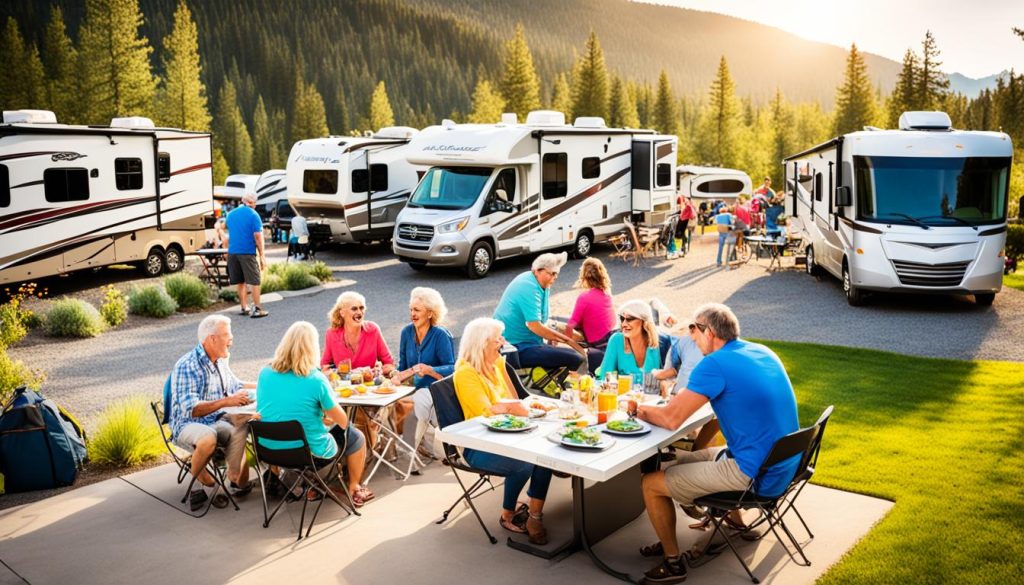
The democratization of RV rentals through these innovative camper sharing websites highlights an exciting era in recreational travel. It’s a phenomenon that not only opens up a world of possibilities for travelers but also provides RV owners with a platform to share their passion and earn from their otherwise idle vehicles. This mutually beneficial situation is a testament to the power of shared economy solutions in today’s interconnected world.
The Surging Popularity of RVshare and Outdoorsy
In recent times, RV sharing platforms have taken the limelight in the travel industry, with RVshare and Outdoorsy at the forefront of this emerging market. The escalation in business for these Peer-to-Peer camper rental services has not gone unnoticed. Both platforms boast significant growth figures, with RVshare in particular reporting a stunning 40% growth. This impressive expansion is a testament to the robust demand for Peer-to-Peer RV hire options, despite challenges such as inflation and high fuel costs plaguing the economy.
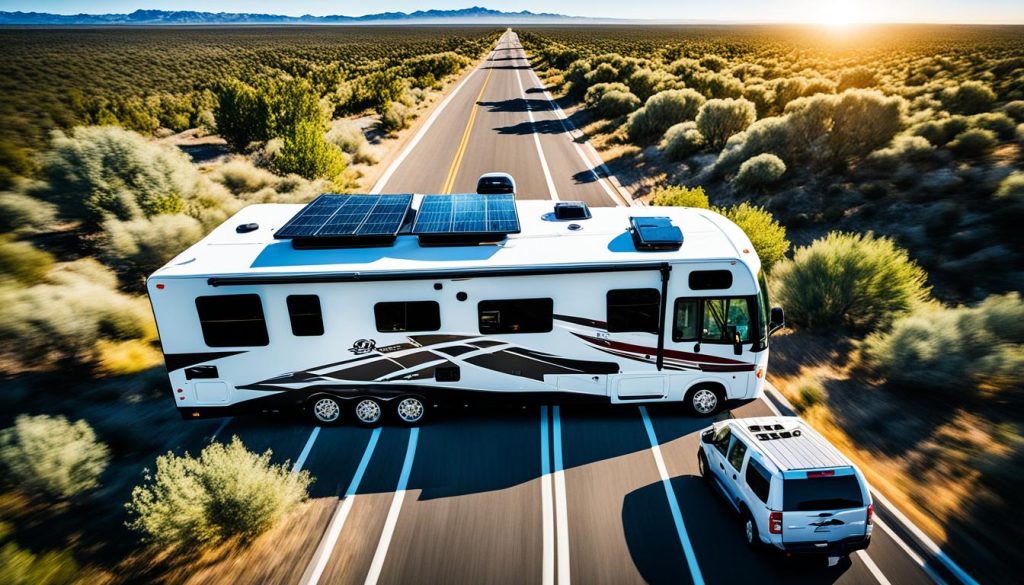
The enduring appeal of these platforms is grounded in the cost-effective and flexible travel solutions they offer. An increasing number of travelers are flocking to these services to book RVs for their summer vacations and other festive travel plans, yielding record-setting reservations. The following table highlights key aspects that underscore their soaring popularity.
| Platform | Advantages | Traveler Experience | Booking Growth |
|---|---|---|---|
| RVshare | Affordability, Wide Selection, Nationwide Availability | Personalized, Comfortable, Family-Oriented | ~40% Increase |
| Outdoorsy | Unique Listings, User-Friendly Interface, Comprehensive Insurance | Adventurous, Authentic, Memorable | High Demand During Holidays |
Ultimately, it’s the combination of affordability, flexibility, and the opportunity to create unique travel experiences that has solidified RVshare and Outdoorsy’s positions as leaders in the RV sharing platforms domain. These Peer-to-Peer camper rental services are not just surviving; they are thriving, shaping a new future for the travel and outdoor recreation industries as they cater to an increasingly diverse and savvy consumer base.
Economic Advantages of Renting an RV
The RV rental marketplace has brought financial ease to travelers looking to enjoy the great outdoors without breaking the bank. As the impact of inflation on RV rentals continues to be a hot topic, it’s noteworthy that RVing remains an attractive option for budget-conscious vacationers. In comparison to traditional vacation costs, booking an RV often translates to considerable savings that can be reallocated to other vacation activities or future travel plans.
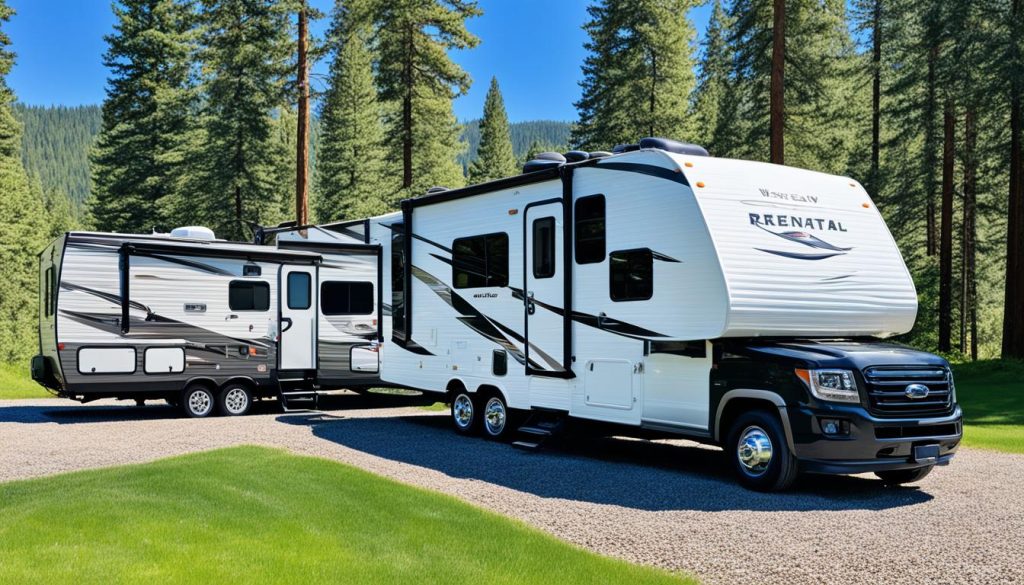
Cost Comparison: RV Rental vs Traditional Vacations
Peer-to-peer RV rentals provide a cost-efficient solution for families and groups looking to adventure without the hefty price tag. When comparing the costs involved in RV travel against those associated with more conventional vacation choices such as hotels, resorts, and flights, the contrast is stark. A typical family vacation that includes airfare, accommodations, and dining out can quickly escalate in price, while an RV adventure offers an all-in-one travel solution that can be significantly more economical.
Price Stability Amidst Inflation and Gas Prices Increase
Despite widespread concerns about inflation and an uptick in gas prices, the RV rental marketplace has demonstrated resilience, with industry leaders like Outdoorsy and RVshare making concerted efforts to sustain pricing stability. The prudent management of rental costs ensures that the spirit of the open road remains accessible to all. This has allowed many to consider RV travel as a viable option, even as daily expenses rise. Importantly, platforms such as RVshare have taken customer-centric initiatives to modulate the financial load of gas price fluctuations, further magnifying the allure of RV rentals as an economical alternative to traditional travel.
The New Trend of ‘Nearcation’ RV Trips
As travel behavior changes take shape in the post-pandemic world, ‘Nearcation’ RV travel emerges as a leading trend among travel enthusiasts seeking cost-efficient vacationing opportunities. This concept of ‘nearcation’—staying within a stone’s throw from home while still experiencing the joys of a getaway—addresses the growing demand for budget-friendly leisure activities that don’t skimp on excitement or freedom.
The trend is increasingly evident as Outdoorsy reports a surge in customers who prefer to travel within a 100 to 200-mile radius from their home base. This travel style is not just about sticking close to home; it’s about indulging in the local splendors that often go unnoticed. The appeal of RV ‘nearcation’ trips lies in their twofold benefits: they are kinder to the wallet and the environment.
“The shift towards ‘nearcations’ aligns perfectly with our mission to provide adventurous yet cost-efficient vacationing options,” says the CEO of Outdoorsy. “Travelers are enthusiastically embracing the chance to explore local wonders while managing their travel budget effectively.”
This change in travel habits reflects a broader societal shift where more individuals are pursuing experiences that offer reprieve without burdensome costs. Beyond the immediate financial savings on fuel, the reduced driving time also lessens carbon emissions, offering a greener way to explore and unwind.
| Benefits of ‘Nearcation’ RV Trips | Traditional RV Travel |
|---|---|
| Less fuel consumption | Longer journeys, higher fuel costs |
| Support local economies | Spread out spending across regions |
| Drive on first and last day only | Extended periods of travel |
| Reduced carbon footprint | Higher environmental impact |
| Cost-efficient vacationing | Increased overall travel costs |
In essence, RV ‘nearcation’ travel offers a refreshing take on vacationing, proving that you don’t have to wander far to wander well. With the reassurance of being near home and the endless possibilities that local adventures bring, this trend continues to redefine the landscape of leisure travel.
Benefits of Choosing Peer-to-Peer RV Rental
The rising popularity of peer-to-peer RV rentals is redefining the way families and adventurers approach travel. These platforms offer an unmatched ability to tailor trips to one’s individual taste, promoting flexibility in travel that traditional vacation packages often lack. This burgeoning method of travel beckons with the promise of adventure, while still ensuring the comforts of home—an appeal widely recognized by the modern-day traveler.
Flexibility and Freedom for Travelers
Those who opt for peer-to-peer RV rental enjoy extensive freedom in their itineraries—one of the key benefits of this travel model. Unlike fixed hotel reservations, travelers can change their plans on the fly, staying longer at spots that capture their hearts or moving on early from places that don’t. This dynamic method of travel is especially enticing for those who prefer a more spontaneous and family-focused vacation.
Inclusivity: Family and Pet-Friendly Adventures
in addition to the liberating aspect of this type of travel, the inclusivity cannot be overstated. Peer-to-peer RV experiences are not just about bringing family along—they are about ensuring every member, including pets, is welcome. Pet-friendly RV experiences means no more heart-wrenching goodbyes to furry friends or cumbersome searches for pet-sitting services. Family and pets alike can jointly discover new landscapes, relishing the shared excitement of the open road.
| Peer-to-Peer RV Rentals | Traditional Vacation Rentals |
|---|---|
| Customizable itinerary | Fixed schedule |
| Lower overall travel costs | Additional costs for lodging, dining, etc. |
| Pet-friendly | Variable pet policies |
| Family stays together | Potential for separate accommodations |
| Immersive travel experience | Typical tourist experience |
How Consumer Behavior is Shaping the RV Rental Market
Recent shifts in consumer behavior are creating waves across the RV rental industry, as more individuals aspire to tailor their travel experiences to their specific preferences and local cultures. These changes are underpinned by a growing inclination for consumer trends in RV rentals, focusing on the value of personalized travel and the allure of local tourism.
Insights from Recent Travel Statistics
The data is telling: a significant uptick in RV rental queries demonstrates the intensifying interest in exploring destinations with a combination of comfort and autonomy. An analysis of rental patterns points to a diversifying market, attracting a broader spectrum of travelers to the eclectic and flexible options presented by the RV lifestyle.
Rising Demand for Personalized and Local Experiences
It’s not just about the destination anymore; it’s about the voyage and the minutiae of experience. Modern explorers are increasingly seeking out yet-unwritten stories of local sights and sounds, diverging from the beaten path to immerse themselves in the essence of their chosen destinations. This is echoed by the surge in rentals emphasizing unique, localized travel over generalized touristic offerings.
Here’s a closer look at the current landscape:
| Preference | Impact on RV Rentals |
|---|---|
| Personalized Itineraries | Increase in custom travel plans and routes |
| Local Tourism | Growth in short-distance rentals and local explorations |
| Authentic Experiences | Rise in demand for RVs that provide a ‘homey’ feel |
| Remote Work | Longer rental periods as travelers combine work and leisure |
This contemporary narrative reshapes conventional travel, steering it towards a future where personalized and local experiences are not just desired but expected as part of the journey. The RV rental market is uniquely positioned to cater to this evolving demand, continuing to offer the freedom and flexibility that today’s consumer not only cherishes but requires.
The Future of RV Travel and Peer-to-Peer Rentals
Amidst a shifting landscape of vacation preferences, the future of RVing shines with potential, fueled by the consistent growth in RV travel. A deeper examination of peer-to-peer rental trends points to an industry primed for continued expansion, offering travelers an appealing blend of adventure, comfort, and cost-effectiveness.
Industry leaders have navigated the waters of changing consumer demands adeptly, positioning their platforms at the forefront of this burgeoning market. As more individuals discover the joys of taking their accommodations on the road, RV travel positions itself as a frontrunner in the revolution of traditional holidays. This is not just a transient phase; rather, it is a signpost of the enduring appeal of the open road and the freedom it represents.
RVing is not just a way to travel, but a lifestyle that is attracting an ever-growing community of enthusiasts.
The trajectory of the RV industry is not singularly a tale of numbers, but a narrative woven by the stories of families and friends exploring together, creating memories in the scenic backdrops of nature’s finest offerings.
- Accessibility of Peer-to-Peer Rental Platforms
- Growing Affordability of RV Travel vs. Traditional Vacationing
- Increase in Remote Work and Location Independence
- Ongoing Development of RV-Friendly Infrastructure
- Environmental Benefits Through ‘Nearcation’ Practices
The table below encapsulates the trends fueling the progressive journey of RV travel, painting a picture of a sector where connection, experience, and discovery drive a new era of holiday-making.
| Trend | Description | Impact on RV Industry |
|---|---|---|
| Consumer Curiosity | Increasing interest in alternative travel experiences | Expands the market with a diverse customer base |
| Economic Factors | Seeking budget-friendly vacation options | Promotes RVing as a cost-efficient solution |
| Technological Advancements | Enhanced platform user experience | Simplifies the booking and rental management process |
| Community Building | Growth of social networks among RV travelers | Fosters a sense of belonging and shared knowledge |
| Inclusivity | Accommodating families and pets | Appeals to a broader audience seeking comprehensive travel solutions |
In conclusion, the allure of the RV lifestyle persists, beckoning a new generation of travelers eager for an unconventional escape. As they flock to peer-to-peer rentals for their next adventure, the roads ahead appear evermore inviting under the vast sky of possibility.
How to Choose the Right RV Rental Platform
Embarking on an RV adventure requires selecting the right rental service that meets all your traveling needs. This decision can be the difference between a smooth journey and a road filled with bumps. Therefore, it is critical to consider various factors such as the diversity of the RV fleet, transparent rental policies, competitive pricing, and support services. Renters are encouraged to conduct thorough research, closely examining and comparing the offerings by reputable platforms in the peer-to-peer RV rental landscape. In this pursuit, peer reviews and the reputation of RV sharing platforms play an indispensable role, guiding the decision-making process with real-life experiences and trustworthiness.
Factors to Consider When Selecting an RV Rental Service
When it comes to selecting RV rental services, prospective travelers should evaluate the assortment of RV options available, ensuring that the platform can provide a vehicle that aligns with their specific vacation goals. Moreover, understanding the rental terms and conditions is crucial to avoid any hidden fees or unexpected policies that could impact your trip. The overall cost, including any additional expenses such as insurance or mileage rates, should also be transparent and within your budget. The convenience of the rental process, from booking to drop-off, should facilitate a stress-free experience, ushering in an era of adventure on your terms.
User Reviews and Reputation of RV Sharing Platforms
User reviews of RV platforms provide a window into the experiences of fellow RV enthusiasts. These reviews can highlight both the peaks and valleys of customer service, vehicle quality, and overall satisfaction with the platform. Furthermore, the reputation of RV sharing platforms such as RVshare and Outdoorsy is an assurance of quality and reliability, acting as the cornerstone for consumer confidence. By contemplating these aspects, travelers can sift through their options and land on a service that not only delivers a promising home on wheels but also ensures a memorable chapter in their travel diaries.

